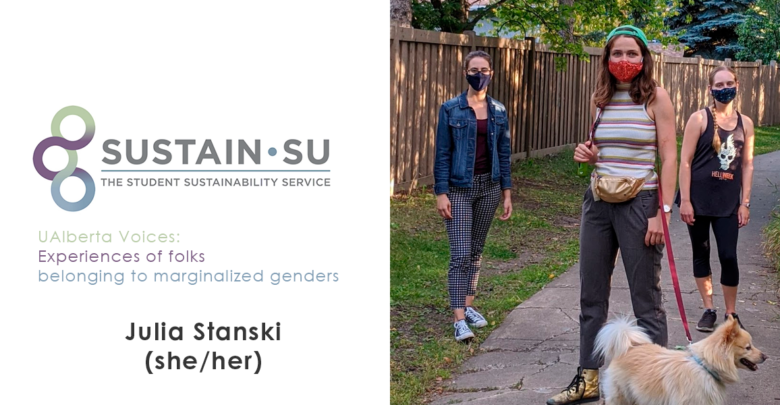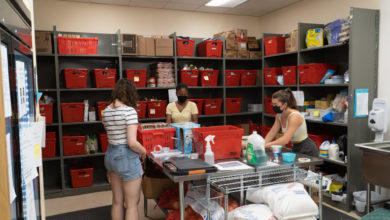Gender inequality in the arts: a Q&A with Julia Stanski
 Pia Co
Pia CoThis guest column is written through a partnership with Sustain SU, a service provided by the University of Alberta Students’ Union. The interviews and articles have been conducted and written by Sustain SU ambassadors, and edited by The Gateway for publication.
This article is the sixth of a multi-part series named “UAlberta Voices: Experiences of Folks Belonging to Marginalized Genders“ that aims to highlight the experiences of students and community members belonging to marginalized genders in leadership positions within the University of Alberta campus and Edmonton community.
This is a question and answer (Q&A) session with Julia Stanski (she/her), on the topic of gender inequality in participation in the arts.
This interview has been edited for brevity and clarity.
Q: Tell us a bit about yourself and what led you to study arts.
Julia Stanski [she/her]: I’m Julia Stanski, and I am in my last term of my bachelor’s degree in arts right now at the University of Alberta. I am a double major in drama and English and a minor in French. I am starting a master of arts program in the fall. I have always been interested in the arts, theater, literature, history, [and] music, so a bachelor’s of arts program was a natural choice for me. My pronouns are she/her; I am currently working part-time at the Centre for Writers at the U of A.
Q: Can you tell us more about your organization, Settle a Score Productions, and what inspired you and your partners to create it?
Stanski: Settle a Score Productions is a local non-profit theatre company. We launched in the summer of 2017, and our goals are to provide performance opportunities to non-professional artists, to foster connection between performers and share the stories of women. We are a female-owned company. My partners, Sarah Dickson and Olivia Menard, are also U of A students. We wanted to create a platform where we could work with other emerging artists and community artists and tell the stories that weren’t being told elsewhere. For the last couple of years, we have been working on our company’s next big project. We are writing an original musical called “Half the World”. It’s set in 1900’s Winnipeg, and it follows the Canadian suffrage movement and the impact of the Great War through a female perspective. In fall 2020, we launched a social media campaign to promote interest and discussion around women’s history, especially in Canada.
We have always been really interested in women’s history. We actually started this project in high school, where we wrote a one-act version of this musical. We produced it at our high school’s one-act festival, we took it to the Zone’s one-act competition, and we performed it at nextNextFest 2016. When we finished grade 12, we decided we weren’t finished with this. We had bigger dreams for it, so we have been working on it for the past five years and it’s continued expanding and developing as we learn through our university studies. We were initially hoping to produce it for Fringe 2022, but we might have to change it because of the pandemic.
Working with my partners, who I have known since high school, has gone really well for the most part. We’ve definitely learned a lot about each other and about how we work. We’ve established clear boundaries between work time and friend time, and we’ve been revising our policies about communication and how we work together all the time as we go on.
Q: In what ways have you incorporated your identity into your organization?
Stanski: All three of us are artists and performers. Olivia is a musician, a composer and a conductor; I am a dancer and choreographer; Sarah is a singer and a writer, and we all love researching. So the work that we do through Settle a Score, writing and producing musical theatre, encompasses a lot of our passions. Of course, we are all women, and we are all passionate feminists. In all the work we do, we strongly believe in supporting female and non-binary artists and trying to represent their various experiences the best we can. For example, in the project we produced this winter, all of our musicians were female, and all of our singers, except one, were female.
It is not hard to find female artists in Edmonton. When our composer was assembling the orchestra, for instance, we didn’t just choose to pick women, she picked competent musicians, skilled musicians who also happened to be women, and there are so many of those in the Edmonton artist community who just need the opportunities. We haven’t worked with professionals yet. So far, we are working mostly with students, so they have the opportunity to grow and develop.
There might be a potential opportunity gap for females to perform. For example, when you get higher up in the music world, a lot of the big conductors of orchestras are male, so having a female composer and conductor in our team is really important to us.
Q: What do you think is the main reason for gender inequality in the arts? How would you like your organization to help change this problem?
Stanski I think gender inequality in the arts is rooted in the gender inequality of our society. As long as it is more difficult for women to access leadership roles and professional opportunities and supports like affordable child care, then we are going to see the gender imbalance reflected in the arts community.
We would like our organization to change this situation. We try to create the kind of opportunities that we want to see for female artists, and we hope that the pieces we produce and we write together are contributing to greater awareness and action on gender inequality.
There are lots of small independent theatre companies in Edmonton; I don’t know many with the specific mandate of supporting women’s stories, but I am sure some of them exist. The opportunities given by these companies vary. A lot of small independent companies have women in leadership roles. For example, Foote in the Door Production, with whom I have worked a little bit, one of their artistic directors is female, and often their stage manager, their music director, the choreographer, the director, quite often are female artists, which is really great to see.
When you get to the higher-up organizations, it gets a little bit different. Places like the Citadel, the National Arts Center, those leadership positions still tend to be male, but I think we are making progress, certainly better than it used to be. For example, the Citadel had an executive director who is female, and we are definitely seeing more women moving into leadership roles in Edmonton theatre. I definitely see more signs of positive change, and I hope it is going to stay. I hope that when these people leave these roles, there will be more women in those roles.
I can’t speak for all of Canada, but from what I’ve seen, I don’t think this progress is just in Alberta, but it is nationwide. Obviously, it is not all-encompassing as I would hope, but I think in various places, there are certain signs of progress.
We have been really lucky with the people we worked with, especially for our first show in 2017. We had a really supportive theatre community. The venue that we worked out of, Anglican Christ Church, were very supportive. They donated rehearsal space for us, and everyone that we worked with within our first production, the people who wanted to be involved with it, all of them were really supportive of young female entrepreneurs, so we were really lucky there.
Q: COVID-19 has impacted many people’s livelihood, affecting various organizations too. From your perspective, how has it impacted the decisions you have made for yourself and for your non-profit?
Stanski: COVID-19 has been influential for sure. We were planning a sort of a music video type project for last spring that we had to shelve when the pandemic hit, so we pivoted. We focused on recording a song remotely and assembled that into a video around Christmas. We required some new skills like audio mixing, which our composer Olivia picked up brilliantly, but it also gave us some opportunities. We could work with singers who were located in various provinces, which we wouldn’t have been able to do in person. We also started our newest social media campaign during the pandemic to try to find a way to stay connected with our base and our artists while we couldn’t do live events, and we also used this time to get a lot of writing done on our current project, as we couldn’t perform live.
Q: As an undergraduate student, what is your perspective on the progress your field of study is making in addressing gender inequality using the arts?
Stanski: I think the arts community at the U of A, at least, is a more welcoming environment for students who belong to gender minorities compared to other faculties. Engineering, for example, is very male-heavy, and I know that’s made it difficult for gender minority students to find support and community there. I found that within my arts degree, there’s been a lot of space and a lot of respect for people with different gender identities within the drama department and English department. I think overall, within my career, within the theatre world, women’s experiences and stories are starting to receive more cultural attention. Especially a couple of years ago, in the wake of the Me-Too movement, we saw a lot of art around that. And of course, there is still a lot of work to be done, but I am optimistic. I think we are moving in a good direction.
Q: Ideally, what kind of policies do you think the government and the University should implement to promote the arts?
Stanski: I would love to see more funding for the arts and the humanities at the University so that smaller programs and departments who study specialized areas could be maintained instead of amalgamated or losing classes gradually as we are doing now. I think the governments need to recognize the value of the arts in terms of quality of life for citizens rather than just in terms of monetary value. The pandemic taught us that when everything else stops, people turn to arts, people go to music, movies, books, television shows, and I think government investment in the arts should reflect that importance. I think the arts community needs to be consulted and involved when the government is making policies around arts and support programs for artists because they know best what kind of programs and support are needed. During the pandemic, for instance, when the emergency benefits started for people who were out of work, artists are going to be out of work for a lot longer than certain people because, when your occupation depends on audiences on large crowds of people close together, that suddenly is not going to come back as quickly as restaurants for example.
I think there are definitely other problems of great importance. I certainly agree that there are other social issues that the government should be spending on, but, like I said, during the pandemic when people have nothing else when the world freezes, I think people of all income levels turn to Art. Whether it is television, streaming concerts, watching movies, reading, I think it is something all citizens and all humans need in some way. For example, programs that bring the arts into underprivileged schools, into elementary schools. Studies have shown that kids who are involved in the arts get better grades, regardless of income level, so involving the arts in life, in all different areas, at all different age groups, it’s always going to have a positive effect in the end. I think if we took that into account when we were thinking about funding the arts, that would make a big difference in the way the government sees it.
Q: Do you think all art should create a positive message?
Stanski: I don’t think all art should be required to send a positive message. I think all art says something about the artists and about humanity, and I think that’s something that happens without the artist even trying, that’s part of creating, there is something of you in everything you make, something about you and about people.
Q: To end the interview, can you offer some advice to women who may be facing similar experiences or want to start a non-profit of their own?
Stanski: Don’t be afraid to go big. If you have a project that you care about, then make it something that you can be proud of, that you are ready to show the world.
It was hard for us to start our company; nobody has ever told us this is how you start a theatre company, but we decided it was important to us, and we were going to do it, and we were going to figure it out as we go along, and we did.
We benefited a lot from looking at the other small independent theatre companies in Edmonton, learning from what they did and how they did things, people like, Empress of Blandings productions and Foote in the Door. They sort of served as models for us, and some of them have also been very supportive mentors to us as we go through this process. Looking at models of companies that have elements of what you would like to be definitely have been helpful.
The time commitment is a lot for sure, which you can probably see in the fact that we have been working on this show for five years. It’s a lot to balance when all three of us started taking five classes, as well as handling things like orchestra, productions, part-time work and volunteering, that we have to do. But we’ve decided that it’s important to us, so we found ways to make time for it. For some semesters, we schedule a meeting every three weeks, and we do writing in between there, sometimes once a week, and we do big chunks in the summer. We got a lot done over the last summer because none of us were working because of the pandemic. It is not easy, but if it’s important to you and if you are organized, you can find ways to make it happen. I guess trying to start a big project that you don’t really know if you have the skills for might be scary. I mean, you’ll never know you couldn’t do it unless you try to do it, and you don’t need to wait for anyone to give you permission to try. If it’s something big, but it’s important to you, and you want to give it a try, then you should absolutely do that because if you wait for someone to give you the opportunity, you might wait forever. So, if you could make the opportunity for yourself, then give it a try.
Q: How can we support Settle a Score Productions?
Stanski: Right now, you can follow us on Instagram and on Facebook, where we are posting weekly or twice a week on things about women’s history, Edmonton history, and more. We don’t have any live events coming out now because of the pandemic, but our next events will be shared on our Facebook and our Instagram.
You can check out the only piece from our show that we have released so far, the song we published at Christmas, and that’s on Youtube, as well as in our social media channels, so you can check that out as well.
We are always open to hearing from other artists, anyone that is interested in performing with us, collaborating with us, we would love to hear from them. We can be reached at [email protected]. Feel free to write to us.
This guest column is written by Sustain SU volunteers through a partnership with Sustain SU, a service provided by the University of Alberta Students’ Union. To learn more about Sustain SU or to get involved, visit their website.




